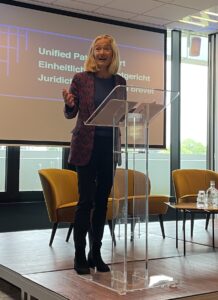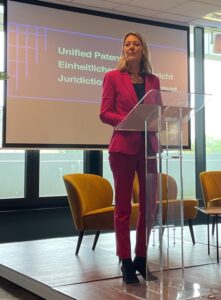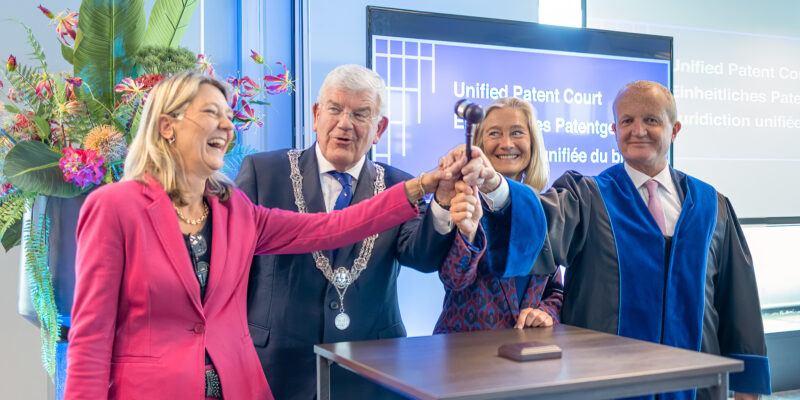Around 200 judges, patent litigators, patent attorneys, other patent experts, representatives of scientific institutions and companies, government officials, The Hague mayor Jan van Zanen and Dutch minister of Economic Affairs and Climate, Micky Adriaansens, attended the opening ceremony of the Dutch local division of the Unified Patent Court today in The Hague.
 Minister Adriaansens stressed the activities of the (local division of the) UPC, which will officially open its doors on the first of June, are very important for Dutch economy and for businesses – ‘the motor of the society’ – in their endeavours to innovate, develop and protect their inventions. She pointed out that efforts to unify the patent regime in Europe date back to 1948 and that language issues blocked many earlier initiatives. According to Adriaansens, it was thanks to the very active role of the Netherlands, together with Sweden and Belgium, that the Unitary Patent system will see the light of day, covering – for now – 17 countries and a market of 350 million people. ‘This gives our economy an excellent position. We have some of the best IP judges in the world and we have specialized and highly regarded lawyers. Just like the office of the EPO in Rijswijk, the local UPC division will stimulate innovation and that is very good news for the Netherlands.’
Minister Adriaansens stressed the activities of the (local division of the) UPC, which will officially open its doors on the first of June, are very important for Dutch economy and for businesses – ‘the motor of the society’ – in their endeavours to innovate, develop and protect their inventions. She pointed out that efforts to unify the patent regime in Europe date back to 1948 and that language issues blocked many earlier initiatives. According to Adriaansens, it was thanks to the very active role of the Netherlands, together with Sweden and Belgium, that the Unitary Patent system will see the light of day, covering – for now – 17 countries and a market of 350 million people. ‘This gives our economy an excellent position. We have some of the best IP judges in the world and we have specialized and highly regarded lawyers. Just like the office of the EPO in Rijswijk, the local UPC division will stimulate innovation and that is very good news for the Netherlands.’
 Mayor Jan van Zanen said The Hague is a city of peace, law and security, including security of intellectual property. He is delighted that after the European Medicines Agency in Amsterdam, the EPO office in Rijswijk and the Benelux Office for Intellectual Property in The Hague, the IP activities in the Netherlands will now also include the local UPC division. It took years to realize and work remains to be done, he said, as only 17 and not all member states of the Unitary Patent system have so far ratified the Unified Patent Court Agreement.
Mayor Jan van Zanen said The Hague is a city of peace, law and security, including security of intellectual property. He is delighted that after the European Medicines Agency in Amsterdam, the EPO office in Rijswijk and the Benelux Office for Intellectual Property in The Hague, the IP activities in the Netherlands will now also include the local UPC division. It took years to realize and work remains to be done, he said, as only 17 and not all member states of the Unitary Patent system have so far ratified the Unified Patent Court Agreement.
Rian Kalden, who is member of the UPC’s presidium and will be presiding judge of the second panel of the Court of Appeal, described the long and difficult process towards the creation of the Unified Patent Court. She recalled how judges could apply for a post at the court for the first time in 2013. ‘They asked whether I would be available for interviews in the summer, but I wasn’t, I was on holiday, far away from the Netherlands.’
 As Kalden said, the German constitutional complaints caused long delays, whereas the Brexit vote caused a lot of confusion. The latter ended abruptly with Boris Johnson who, contrary to declarations of the government of Theresa May that the Brexit would not change the UK’s position regarding the Unitary Patent system, pulled the plug in 2020. The last two complaints against German ratification of the UPCA were dealt with faster than expected, so in July 2021, unexpectedly for many, the road to the creation of the UPC reopened.
As Kalden said, the German constitutional complaints caused long delays, whereas the Brexit vote caused a lot of confusion. The latter ended abruptly with Boris Johnson who, contrary to declarations of the government of Theresa May that the Brexit would not change the UK’s position regarding the Unitary Patent system, pulled the plug in 2020. The last two complaints against German ratification of the UPCA were dealt with faster than expected, so in July 2021, unexpectedly for many, the road to the creation of the UPC reopened.
According to Kalden, many compromises had to be found, leading among others to a quite complex UPC structure. She praised the efforts and endurance of the people who were involved and predicted interesting, challenging times. It is inevitable that sometimes things will go wrong, but with flexibility and a positive mindset these can be overcome. Remarkably Kalden hesitated when she was asked whether anything could still prevent the start of the UPC on the first of June. Encouraged by some spectators, she finally said ‘no’.
After her speech Rian Kalden, her colleague Edger Brinkman, Jan van Zanen en Micky Adriaansens ‘opened’ the local division by jointly using a special UPC hammer for the first time.
 In a panel discussion, positivity about the UPC was the recurring theme. IP director Roelie Kingma’s explanation that her company Nutreco has chosen a wait and see approach concerning the UPC and has opted out most patents, was received with some disappointment and criticism. Contrary to the statement of Leo Steenbeek of Philips, who said his company has chosen not to opt out, unless there are very good reasons, because the UPC, with its efficiency, quality and rulings which have effect in 17 member states, has enormous advantages. Philips will apply for a Unitary Patent if it seeks patent protection in more than three UP member states.
In a panel discussion, positivity about the UPC was the recurring theme. IP director Roelie Kingma’s explanation that her company Nutreco has chosen a wait and see approach concerning the UPC and has opted out most patents, was received with some disappointment and criticism. Contrary to the statement of Leo Steenbeek of Philips, who said his company has chosen not to opt out, unless there are very good reasons, because the UPC, with its efficiency, quality and rulings which have effect in 17 member states, has enormous advantages. Philips will apply for a Unitary Patent if it seeks patent protection in more than three UP member states.
Discussion leader Wouter Pors, Bird & Bird partner and a long-time advocate of the UP system, stressed the quality of the UPC judges, and the unfounded concerns about unpredictability of decisions at unexperienced local divisions. Besides a local judge, two more experienced judges will always be involved and of course, there is always the option of appeal, he pointed out.
 Pors and judge Edger Brinkman (to the right on the top photo), among others, agreed that the local UPC division in The Hague could become a popular venue, as the Dutch were closely involved in drawing up the Rules of Procedure, Dutch IP judges have a reputation for issuing quality decisions at relatively low costs and English as process language is no problem at all for them. Edger Brinkman explained that as there are different national traditions it has to be seen how some decisions in UPC cases will turn out. Rian Kalden expects some changes in decision making in patent cases in the Netherlands as well. ‘Think UPC’, is the mission.
Pors and judge Edger Brinkman (to the right on the top photo), among others, agreed that the local UPC division in The Hague could become a popular venue, as the Dutch were closely involved in drawing up the Rules of Procedure, Dutch IP judges have a reputation for issuing quality decisions at relatively low costs and English as process language is no problem at all for them. Edger Brinkman explained that as there are different national traditions it has to be seen how some decisions in UPC cases will turn out. Rian Kalden expects some changes in decision making in patent cases in the Netherlands as well. ‘Think UPC’, is the mission.
Will UPC litigation become dominant to the detriment of national patent litigation? The majority of the audience didn’t think that is realistic. The general feeling seemed to be that a period of four to five years is more likely.
(Photo on top: Elena Kamphuis, other photos: Kluwer Patent Blogger)
________________________
To make sure you do not miss out on regular updates from the Kluwer Patent Blog, please subscribe here.




“relatively low costs”
Court fees in NL: 667eur
court fees in UPC: 20.000eur/11.000eur
Ministers should learn how to count.
out of curiosity how much do you think a full litigation cost in NL including your attorneys fees ? What about the court fees in DE ? Who was litigating in NL and not in DE in the past ?
I remember the 1970’s, when many corporations adopted a “wait and see” line in relation to the EPO and, particularly, the PCT. It took an entire generation of patent practitioners, before the PCT/EPC system became ubiquitous and unassailable. Does anybody seriously expect a transformation in anything less than one full patent term?
Meanwhile, the large multi-jurisdictional patent litigation firms are gearing up enthusiastically to exploit the new business opportunities for feeding from the uncertainty, and then co-ordinating litigation in London with litigation before the UPC. Their fees are going to be significant, legitimating the claim made here, that litigating in The Netherlands has been done, up to now, at “relatively low cost”.
Max, I have to say that I struggle to understand the fact that almost all litigators seem to be incredibly enthusiastic about the opportunities that the UPC will bring. This is because the whole idea of the UPC is to REDUCE the total amount of litigation across Europe. Thus, whilst there will be a select few companies that will gain a big UPC-related windfall, it seems inevitable that the majority will lose out in the end.
Perhaps I am missing something. Or perhaps what we are seeing now is a product of no firm wanting to think that they might be the ones to lose out. Only time will tell.
On a slightly different note, the enthusiasm of the litigators seems to me to have a lot to do with the thought of being able to charge increased (hourly) rates for UPC-related matters. This is all very well for the clients that can afford those increased rates, and that might therefore be able to take advantage of the (supposed) benefits of the UPC. But what about SMEs, which are so important to Europe’s economy? Again, it seems inevitable that, whilst a select few (big) companies will get a boost from the UPC, the majority of (smaller) companies will lose out in the end.
So can we conclude that the UPC is a system designed by the few for the benefit of the few (and those that they serve)? You might say that, but I could not possibly comment.
I do say that. Absolutely!
Sir Humphrey’s catch phrase was (if the internet can be trusted) was: “You may think that, but I couldn’t possibly comment”. The good thing about threads like this one is that 1) one can do more than think that; one can say it out loud, and 2) when you say it, I certainly can comment.
Not that it does any good though. It is as Axel Hacke laments: Auf mich hoert ja keiner.
@Max: in fact that was Francis Urquhart in (the original and best) House of Cards…
That the judges and members of the legal profession set to earn much more money with the UPC are fully in favour of it is no surprise.
When you know the fee level for national litigation, you can imagine what it will be for a multinational litigation! Deep pockets will become even deeper. This is the more so since procedural time limits are very short at the UPC.
For the judges and the registrar, it is even better as their revenue from the UPC will not be added to their other revenues in order to determine the overall tax level, see Art 9(3,b) PPI applicable to judges and compare it with Art 10(3,b) PPI applicable to other “staff” of the UPC.
That many compromises had to be found is a euphemism. Let’s just hope there were not the worse compromises possible as it happened with the central division.
When one sees what Mr Steenbeek has said in favour the UPC and the way the problem of the London Section should be fiddled with, it is not a surprise that Philips will not opt-out. His company is part of the big industry which should profit more from the UPC. I would however be a bit weary as 2/3 of the granted patents are held by proprietors from outside the UPC contracting states, and the UPC opens a single door for litigation.
That Nutreco with its “11 000 dedicated employees in more than 40 countries”, cf. Home page, opts-out does not really bode well for the UPC. If a company of this size opts-out, what should a SME do?
In spite of all what the proponents of the UPC have ever claimed, the UPC is not for SMEs. They simply cannot afford it, even if there are ceilings to recoverable costs. The initial costs for litigation before the UPC is way too high. But all the tax free salaries of the judges and the registrar have to come from somewhere.
It will be interesting to see if part-time technical judges will sit at the local division in The Hague. In national proceedings in The Netherlands, technical judges can only be called once they are out of active service.
One could think of some constitutional problems in The Netherlands but also elsewhere. For example, commercial courts in France (except for 3 departments in the east of France), are manned with active business people. Some decisions have been heavily criticised as they more than often think of the advantages for their own firm than a good and fair administration of justice.
The situation of the UPC with respect to the “withdrawal” of the UK is far from being clear and settled in a way respecting the rule of law. Just think of what Mr Steenbeek uttered.
Even Mr Hoyng’s plea on this platform in favour of the UPC with sunny beaches is anything but convincing. At least some sun protection factor will be badly needed.
That contribution reminds me of the commentary from a UPC promoter in a big law firm in the USA. He explained that the ultra-short terms presecribed by the Rules will force litigants to choose firms with a slew of so-called “Silverback” litigators, or else lose the litigation. Now, the multi-national corporations have always routinely deployed whole batteries of top lawyers whenever litigation looms. The top priority is not to lose, regardless of the cost. Perhaps ask Philips?
But do European SME’s have any inkling of any of this? Do they realise how much even one Silverback costs, never mind a whole team of them? Lambs heading for the slaughterhouse, they look like to me.
UPC was voted by (the majority of) the politicians including MEPs of the EU Parliament, so no discussion whether it should come or not: it should because of the fundamentals of democracy. Countries which do not adhere should rather question their own presence in a shared and „democratic“ body like the EU. That its functioning is suboptimal and improvable does not surprise me, justice, equity and lawfulness are usually questionable in every law system, especially outside of Europe, and to be so for a patent system is surely much less serious and worrying than in the penal law
“UPC was voted by (the majority of) the politicians including MEPs of the EU Parliament”
A powerless legislator: the EU is not part of the Agreement.
If something goes bonkers, the European Parliament won’t be responsible.
@ law sniffer,
Having been voted by various parliaments does not necessarily mean that the vote was, as such, democratic. It can only be considered democratic if the MPs, also those of the European parliament, would have been correctly informed of the ins and outs of the ratification and the effect on European industry. Reasonable doubts are permitted. Have they been correctly informed of the risks for European SMEs? Certainly not, as the proponents of the UP/UPC system insisted on the positive aspect for Europe’s SMEs. They even now accept that it was a fallacy.
Has it been made clear what it means to have a single access point for litigation and the corresponding advantage for non-UPC patent holders (2/3 of them)? The big beneficiaries are large, internationally active, litigation firms. And they have been pushing all the way long! They have been helped by some industrial lobbies which wanted to play in the big league.
The best example is the second ratification in Germany which took place after the Brexit. Have the German MPs been made aware of the consequences of Brexit? Certainly not. When comparing the accompanying note for the second ratification and some articles published by staunch supporters of the UPC, the resemblance is flabbergasting. No wonder as the civil servant in charge of the UPC project in the German ministry of justice is presently acting chair of the Administrative Committee of the UPC.
A similar situation existed a few years ago in the European parliament. The EUP voted a resolution condemning patents for software. At this time, the “free software” lobby had managed to convince MEPs that patents for software were bad. Some comments of the former French Prime Minister, the late M. Rocard, showed that he was just parroting what the free software lobby told him.
With the UPC it was the lobby of large, internationally active, litigation firms which was very active. It is ironical to see how within a few years, one lobby has simply replaced another. The lawyer’s lobby was more powerful as it manged to get an international treaty well-tailored to its financial interests.
It reminds me of the lobby of the pharmaceutical industry which manged to bring in the EPC a big dent in the notion of absolute novelty for the first medical use of a known product. In the revision conference the pharma lobby wanted even to extend the novelty to the second and any further medical use. This time it did not succeed.
The comparison with penal law is adequate as it is criminal what has happened here. Nothing against European integration, on the contrary, but not for this type of integration which only helps lobbies. The politicians in Brussels and in some EU member states have shown to be very gullible for what the lawyer’s lobbies told them. It was enough to tell them that the importance of Europe and its economic attraction would be increased. The other side of the medal has been carefully hidden.
agree, political decisions are always taken like that and even if you made the best possible citizens the decision makers things would not change. Conspiracy and big powers theorists will always get plenty of fuel, only under a dictatorship they would not get any and could not freely express their superiority through their hindsight theories, thats why I feel really lucky that I can hear so many different opinions
I can agree that we are able to hear different opinions.
Where I do not agree upon is that certain opinions are forced upon us by lobbies.
This is by no ways democratic.
well, decisions must be proven to have been influenced by which lobbies, and many lobby for good, without profit, so allegations in such broad terms don’t bring anywhere, are rather just excuses of know-it-all people for not accepting democratic decisions
When looking at opt-out/opt-in decisions, do not jump to square UPC litigation. A minuscule proportion of patents (less than 1%) will have their day in court while renewal fees will have to be paid every year for all patents. Looking at renewal costs, the unitary patent is attractive depending on the number of countries in which coverage is desired.
UPC costs must not be the tree which hides the forest of unitary patent costs.
Claiming that the renewal costs for a European patent with Unitary Effect are cheaper than for a mere granted European patent is another fallacy brought forward by the proponents of the UPC. This argument has been widely pushed when trying to sell the UPCA to national parliaments.
It is certainly cheaper compared to a validation in all contracting states of the UPC or EPC. When looking at the average number of validations of granted European patents, we come on average between 5-7 validations for all EPC contracting states, and on average 3-5 validations for all UPC contracting states. Renewal fees cannot be the determining aspect for not opting out.
The only big beneficiary will be the pharma industry which validates in a maximum of countries and keeps its patents, with the help of SPCs, as long as possible.
Even if the number of patents ending up in court is rather low, the costs of litigation before the UPC are indeed so high that the saving on renewal costs will in the end be rather modest, if at all. And for some branches litigation in the UK will still be necessary. And there the costs there are far from negligible.
In spite of the ceilings for recoverable costs, the actual litigation costs before the UPC are the best deterrent to keep away SMEs from this path.